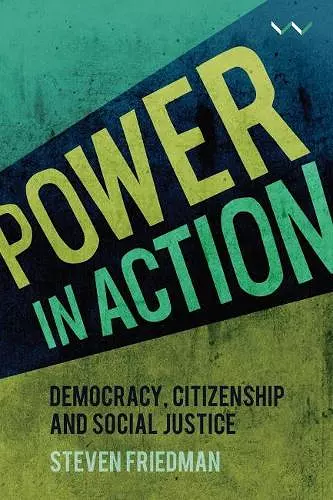Power in Action
Democracy, citizenship and social justice
Format:Paperback
Publisher:Wits University Press
Published:30th Dec '18
Currently unavailable, and unfortunately no date known when it will be back

‘What are democracies meant to do? And how does one know when one is a democratic state?’
These incisive questions and more by leading political scientist, Steven Friedman, underlie this robust enquiry into what democracy means for South Africa post 1994. Democracy and its prospects are often viewed through a lens which reflects the dominant Western understanding. New democracies are compared to idealised notions of the way in which the system is said to operate in the global North. The democracies of Western Europe and North America are understood to be the finished product and all others are assessed by how far they have progressed towards approximating this model. The goal of new democracies, like South Africa and other developing nation-states, is thus to become like the global North.
Power in Action persuasively argues against this stereotype. Friedman asserts that democracies can only work when every adult has an equal say in the public decisions that affect them. From this point of view, democracies are not finished products and some nations in the global South may be more democratic than their Northern counterparts. Democracy is achieved not by adopting idealised models derived from other societies – rather, it is the product of collective action by citizens who claim the right to be heard not only through public protest action, but also through the conscious exercise of influence on public and private power holders. Viewing democracy in this way challenges us to develop a deeper understanding of democracy’s challenges and in so doing to ensure that more citizens can claim a say over more decisions in society.
"This is Steven Friedman at his best, combining an implicit passion for democratic change with considered analysis and judgement. By democratic change Friedman means going beyond electoral choice. He means that those who are poor must be able to shape and construct their own lives, structures of living and life choices. This is hardly simple and Friedman argues it is a long project in the making – but that it needs to be made. His argument forms an intellectually considered backdrop to unrest in today’s South Africa. It is a quarter century since majority rule elections were meant to transform South Africa – yet everywhere there is poverty, and there are the preludes to a great clash between elite views of what democracy entails, and what the economically disenfranchised will demand. Friedman’s book makes a critical and timely contribution to an urgent debate – timely because there may not be much time left."-- Stephan Chan, Professor of World Politics, School of Oriental & African Studies, University of London
ISBN: 9781776143023
Dimensions: unknown
Weight: unknown
300 pages